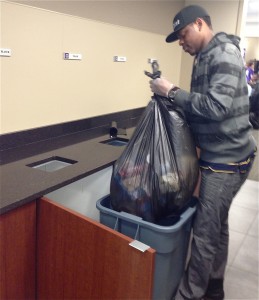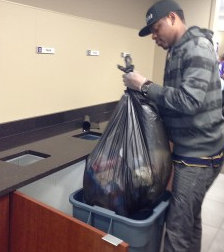St. Thomas’ Green Team and Physical Plant are working together to make St. Thomas a greener place, but the university’s ranking in the RecycleMania competition suggests otherwise.
RecycleMania is a competition that ranks colleges and universities nationally in terms of how much the campus recycles. St. Thomas is ranked 120th out of 251 schools, with MIAC schools Macalester in 65th and St. John’s in 115th.
Green Team member senior Quinn Wrenholt said he’s disappointed by St. Thomas’ ranking.

“In my mind, recycling is one of the easiest things you can do to be slightly more environmentally conscientious,” Wrenholt said.
Coordinator of Recycling and Central Receiving Bob Douglas, who is also involved with the RecycleMania competition, said the problem isn’t with St. Thomas failing to promote recycling.
“My perception is that recycling has fallen not because we don’t have recycling, but because the enthusiasm is down,” Douglas said. “It’s just a part of the background in people.”
Wrenholt, however, said the university’s low ranking in RecycleMania competition could actually be because some students may not know about it.
“I know that the Green Team and the physical plant puts a lot of time into promoting the event (RecycleMania),” Wrenholt said. “But at the same time, there are a percentage of students who have never heard of it, never read the signs that are posted up here and there and some who definitely don’t participate.”
Douglas is skeptical about St. Thomas’ current rankings, as he believes that the competition is somewhat unfair. Some universities recycle in a single-stream fashion. This means that all recyclable materials are gathered together by a waste collector, suggesting that their figures may not be accurate.
St. Thomas sorts all of its recyclable materials separately, so it knows the exact numbers.
“The waste loader gives them the figure. What you wonder sometimes is, ‘is this an accurate weight or does the hauler know that we’re in a competition?’” Douglas said. “Ours are pretty accurate because we continue to separate and we get weight figures on each commodity.”
Douglas said single-stream sorting also has other repercussions and in some cases, the method creates more waste.
“So the problem with single-stream is when you mix paper with glass and plastic, then you have a certain percentage of it that is trash because it can not be used,” Douglas said. “You can not take paper that has small fragments of glass on it, or is wet and is holding other things against it.”
While Douglas has some doubts about the figures, he is proud of the other universities like Macalester and St. John’s, and said their locations and identities contribute to their rankings.
“I know that Macalester is far ahead as far as sustainability goes, and also, as a university, more dedicated to it,” Douglas said. “I mean, they did put up a windmill turbine. They’ve had local foods … in their food services because that’s what the students wanted. They’re much more sensitive to that (environmentalism).”
As for St. John’s, Douglas related their ranking to their location.
“They’re by themselves out there, and they have a great school spirit,” Douglas said. “When you live in the woods, you are surrounded by nature. I think it helps you to think about how we want to preserve this, rather than at an urban school.”
While junior Sam Sutton has never heard of the RecycleMania competition, he said St. Thomas does a good job of promoting recycling.
“(St. Thomas) advertises and implements recycling well,” Sutton said. “They have all the essential types and just about anywhere there is a garbage can there is recycling of all sorts right along next to it.”
Douglas said St. Thomas has developed certain strategies to make the necessity to recycle more noticeable.
“In the new Anderson Student Center, we changed the labels from ‘trash’ to ‘landfill.’ So, it isn’t just going away, but it’s going someplace and it’s going someplace local,” Douglas said. “It’s going to go someplace that’s going to cost us money, and it will cost us money for generations.”
Sophomore Tess Wang said she sees why St. Thomas isn’t ranked high in the competition.
“I don’t think St. Thomas is good at recycling because even when people who are generally good at recycling go to put their recyclable trash away, there are items that are recyclable that the bins don’t allow for, like Styrofoam,” Wang said.
Douglas said the low ranking could come down to apathy about putting recyclables in the correct bin. He said eight years ago, an environmental studies senior seminar class researched how many recyclable items were thrown in trash cans.
“They found 40 percent (of the trash) in any can they picked could have been recycled,” Douglas said.
Kayla Bengtson can be reached at beng2004@stthomas.edu.


Adding to this issue is the rate at which recycling bins are disappearing around campus. I’m noticing far less blue recycling bins with the various labels of paper, cans, glass & bottles. People are more worried about the appeal of an area than the health of the environment. If a student just finished their pop and wants to throw away the bottle, they will target a trash can first. The recycling bins are not as common or visible as the trash cans anymore, or shall I say, the “landfill” locations.